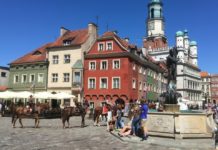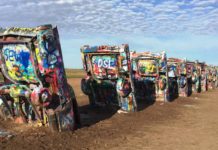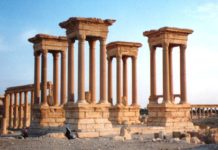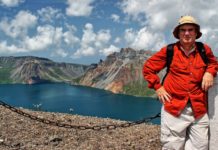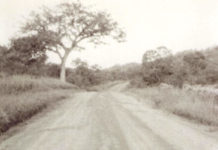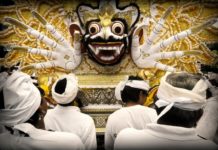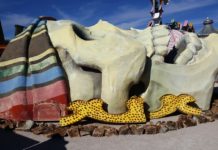CHAPTER 11
He’s a stranger in a strange land. Just a stranger in a strange land. – “Stranger in a Strange Land” by Leon Russell (1971)
Ted and I had camped in a grove of olive trees. When we woke up about 9:30, the sun was already blazing hot. Nearby, a bunch of kids were tending a small herd of goats and staring at us in astonishment. Maybe they thought we were the demons in the desert. We waved to them and shouted, “Good morning!”
Their mouths fell open as we stumbled out of our sleeping bags and packed up. We started walking down the road. There wasn’t a car in sight and nothing but sand in every direction. We wondered if we made a fatal error by getting out of Ibrahim and Mahmoud’s car.
As panic was beginning to set in, a large white Mercedes roared up and screeched to a halt right in front of us. At the wheel of the shiny, new car was an older, distinguished Arab man wearing a head scarf and a long flowing white robe. His name was Ali, and when we told him that we were going to Tripoli, he offered to take us all the way there.
Ali was an amiable guy whose English was good. Like others we had met, he was eager to talk to us. The cool leather seats and air conditioning felt fantastic. We knew how lucky we were to get the ride.
Our conversation got off to an odd start.
“Have you heard?” he asked. “Today in America, some assassin shot the politician, George Wallace. He is not dead but gravely wounded.”
Receiving such a random piece of news from a complete stranger in the middle of the desert was bizarre. In my mind, it was just more senseless violence at home. Ted and I were unable to give him a reason why things like that happened in the United States. However, it kicked off a good political discussion, and it was interesting to get our driver’s opinion on what was taking place in his own country.
Ali explained to us that Muammar Gaddafi, the President of Libya, came from a very poor family. He had been raised in a tent in the desert but went on to join the military, stage a coup in 1969, and become the nation’s ruler.
As we got close to Tripoli, the traffic was heavy. Volkswagen bugs and old cars from the fifties and early sixties packed the highway. Strangely, most of the new cars were Mercedes. Everyone on the road was a reckless driver. Ted and I held on for dear life as we swerved through traffic and repeatedly came close to crashing head-on. Abandoned cars from accidents littered the side of the road. When Ali dropped us off near the harbor, we were grateful to have arrived in one piece.
Tripoli was a large metropolis with wide, modern boulevards that were lined with tall swaying palm trees. For Americans like Ted and me, it was a weird place. All the women on the street – and there weren’t many – were wearing an abaya and a niqab, leaving only their eyes visible. The outfit completely covered them from head to toe. We had seen women wearing similar clothing on our trip, but not to this extent.
The city looked fascinating and ancient, located on the Mediterranean Sea with a beautiful beach and harbor area. All I wanted to do was sit down for a while, get the pack off my back, and get some sleep. Since leaving Tunis, we’d been moving nonstop and were both hungry and weak.
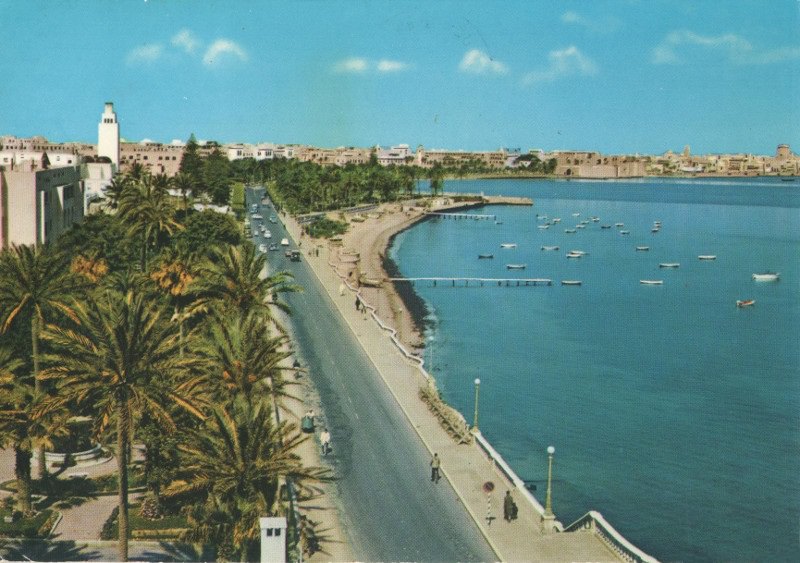
When we asked people on the street where to find a hotel, they were unable to help because nobody spoke a word of English. To add to the difficulty, all the signs were in Arabic. After scouring the streets, we finally found a hotel.
Throngs of young men were milling around everywhere we went. Like in Tunisia, many were holding hands or hanging all over each other, and almost all of them stared at us or laughed. Apparently, we were not welcome, and it was somewhat unnerving. Ted and I decided to get our Egyptian visas and leave Tripoli as soon as possible.
That evening at our hotel, we talked to the staff who spoke a little English. In whispered voices, they complained bitterly that Gaddafi was ruining the country because alcohol and other Western luxuries had been outlawed.
Two guests at the hotel had gotten their hands on a bottle of whiskey, and we snuck up to the roof and drank it under a sky full of stars. A cool breeze drifted in from the ocean, and the mysterious sound of the call to prayer blasted throughout the city on loudspeakers. When I told them that I was a draft dodger, they were surprised but supportive. They also believed that the Vietnam War was stupid and illegal.
At the Egyptian embassy, we were informed that we were not permitted to travel overland to Cairo. Because of military and security issues related to Israel, we could only go as far as a city called Benghazi. From there, we’d have to fly to Cairo. The official told us that if we had ever visited Israel, we would be denied entry to Egypt. After close inspection of our passports, it was clear that we had never been there.
The best thing about Libya – perhaps the one good thing – was our luck in getting rides. After we walked to the edge of Tripoli, we immediately got a lift. Again, an older man in a Mercedes picked us up, but he barely spoke English. Ted and I managed to convey to him that we were going to Benghazi, and he told us that he could take us halfway, to the town of Sirte.
When Ted and I arrived in Sirte, we were famished and bought something that looked like a hummus pita sandwich from a street vendor. Whatever it was, it tasted delicious.
Sirte was a primitive town with an interesting main street and attractive oceanfront. One of the locals having lunch with us told us that Muammar Gaddafi’s birthplace was in the area.
Our next ride was from two construction workers. Covered in dirt, they took us the rest of the way to Benghazi in their old van. They didn’t speak a word of English, but were extremely curious about us.
The road from Sirte to Benghazi hugged the coast of the Mediterranean Sea and passed through some small villages. We often stopped for a herd of goats or sheep that were crossing. The residents looked poor, which surprised me because I had heard that Libya was wealthy from their oil. Obviously, the money had not trickled down to these people.
When we arrived at the road that led into the Benghazi Airport, the driver of the van pulled over and dropped us off. It took us about seven hours to hitchhike from Tripoli, and we had gotten in and out of the country in less than 72 hours.
The minute the plane was off the ground, the flight attendants brought out alcohol and everyone ordered drinks. Ghaddafi’s ban on booze had fueled an insatiable craving for it. While I was on my second whiskey, I looked out the window and saw three pyramids! To see them plopped down in the middle of nowhere was mind blowing. It was one of the most unforgettable sights I had ever seen.
“When we did not give them any money, the group became agitated, demanding, and jabbed at us with their hands.”
Our plane landed in Cairo on May 17, 1972. The airport was a huge, hot, crowded, chaotic mess. The moment we got into the terminal, we were besieged with offers for taxi rides into the city. The aggressive demands turned us off, so we went outside to see if we could find a bus to the city center. We figured we would also save some money.
Ted and I boarded a dilapidated old bus that was jammed with people, luggage, and animals. Anybody who couldn’t get a seat was hanging on the outside by holding anything they could grab onto, or they were riding on the bumpers.
When the bus reached what we thought was the last stop, we got off. Unfortunately, we were not in Cairo. In fact, we weren’t anywhere near Cairo. We were in the middle of an enormous slum filled with throngs of filthy, desperately poor people dressed in rags and no shoes. They looked like they had not eaten in days.
No one had ever seen anyone like us. We may as well have disembarked from a flying saucer. Ted and I drew a crowd of both adults and children with outstretched palms. When we did not give them any money, the group became agitated, demanding, and jabbed at us with their hands.
Without warning, two policemen charged through the large group. Anyone in their way was hit with a wildly swinging club. When the police got to the center of the mob, they saw that we were the cause of the commotion. They reprimanded Ted and me, hauled us to a different street, and shoved us on a bus. During the entire fiasco, not one word of English was spoken. We weren’t even sure if they put us on the correct bus.
Thankfully, we were brought to Cairo’s city center, and the surroundings were far more civilized than the place we had come from. Ted and I left the huge bus terminal and tried to find the youth hostel.
“The guys were cheating at blackjack, letting the girls win, and hoping to get paid back with sex.”
Cairo was crowded, dusty, and sprawling. The roads were filled with anything that had wheels – not just cars and trucks, but donkey carts, bicycles, and people pushing wheelbarrows full of goods. It all moved slowly to the relentless sound of honking horns. Adding to the cacophony were shopkeepers and vendors shouting to tourists, loud music pouring out of windows, and loudspeakers blaring out the call to prayer.
The city was throbbing with action. At least everyone was friendly, which was a welcome change from what we’d experienced in Libya. It felt good to be in a city that was tolerant enough to allow alcohol consumption. We also noticed a lot more Westerners than we’d seen in either Tunis or Tripoli.
On the bank of the Nile River, across from the Hilton Hotel, we found a spot with benches. Ted and I relaxed and drank several bottles of cold Egyptian beer. We were proud of how far we’d come in our short time on the road together.
Although the youth hostel was a real dump, we had our own beds and the use of a shower. That was all that mattered. As a bonus, there was a strange assortment of humans spending time within its walls. Surprisingly, among them were two wild and crazy girls from our hometown of Pasadena, California!
Tanya and Gail were both 21 years old and traveling together for a few months. One of their fathers owned a successful chain of restaurants in California. The four of us laughed at the strange coincidence of meeting someone from home in a faraway place like Cairo. Although they were not the type of women Ted or I were sexually attracted to, they were a lot of fun to be friends with.
Once we got to know them better, they told us an unbelievable story about the two Egyptian guys that they were dating in Cairo. Both men were blackjack dealers at a casino in one of the swanky hotels. The guys were cheating at blackjack, letting the girls win, and hoping to get paid back with sex.
With a wicked twinkle in her eye, Tanya was the feistier of the two. Her warm brown eyes and long straight brown hair made it easy to imagine how she could effortlessly lead two men into believing that there would be a big payoff for them.
Gail was not as talkative, but she wasn’t shy either. Her broad shoulders and wide hips gave her the look of a big, beautiful farm girl. She had soft blue eyes and a gorgeous head of curly blonde hair that tumbled down her back.
One morning, they disappeared without saying goodbye. I didn’t think too much of it because people were coming and going from the youth hostel every day. I just assumed they had moved on.
I couldn’t put it off any longer, so I made my way to the American Express office and collected my mail. I wasn’t surprised to see the large white envelope from the Selective Service System, and I already knew that the news would not be good. My stomach churned as I opened it.
The words were nearly the same as the previous one, but this time they sounded more urgent. They demanded my immediate return, and listed three potential places where I could report: Germany, San Francisco, or Guam. How thoughtful of them to give me options!
The Selective Service must have realized how slow the lines of communication were. They couldn’t possibly know if I left Tunisia and arrived in Egypt. For all they knew, I never even made it to Cairo. Unexpected things, like demons in the desert, for instance, could have delayed me for weeks.
Now what was I going to do? What would I tell them? I was getting close to the point of blatantly defying them. Short of reporting for duty, the only option was to continue traveling.
“Ted didn’t want to be seen in public until he got his teeth fixed, so I made all the food and beer runs, and we hibernated until the job was done.”
To keep up with the news from America, I bought an issue of Newsweek and learned about the antiwar protests that continued to go on. With great interest, I read about the Paris Peace Talks that were taking place to try to end the war. But another article said that the U.S. and its allies were bombing Hanoi. Perhaps the war’s end was in sight.
We chose to stay in Cairo for a while because we wanted to explore it in depth. Also, Ted needed to take care of a serious dental problem. During high school, he had damaged his two front teeth in a hockey game and required some major work. It wasn’t easy finding a dentist who could help him. The one we located explained that he’d have to grind down the remainder of Ted’s front teeth and make him new ones.
It just so happened that the dentist owned an apartment adjacent to the American University. When we told him that we planned on being in Cairo for a while, he asked us if we’d be interested in renting it. We eagerly agreed to pay him for one month. The following day we moved out of the youth hostel.
For 85 dollars, we got a large two-bedroom apartment that overlooked the tennis courts of the university in a great part of the city. Ted and I were really happy to be out of the youth hostel.
One of the best things about our new place was that it was in a peaceful neighborhood. We could actually sleep without the constant thrum of the city around us. Cairo was rarely quiet.
Ted didn’t want to be seen in public until he got his teeth fixed, so I made all the food and beer runs, and we hibernated until the job was done. The dentist turned out to be a real pro, and Ted figured that he paid $30 for what would have cost about $1,500 in the United States.
Once Ted was willing to go out again, we went to a nearby restaurant to test drive his new teeth. When we walked over to the bar, Tanya and Gail were sitting there having a drink. We asked what had happened to them, and they told us that they had traveled down to Luxor and the Valley of Kings to see King Tut’s tomb.
Once they heard about our new digs, Tanya and Gail pleaded with us to let them move in. Ted and I sublet one of the bedrooms to them, and we wound up getting the place for practically nothing.
The more Tanya and Gail told us about their Egyptian blackjack dealer boyfriends, the more we realized that the two girls were asking for trouble. It was clear that they were stringing the guys along. The men would eventually expect sex from them, but the girls had no intention of giving it up.
One night, they invited us to go to the casino. Tanya explained that the dealers were cheating by giving specific hand signals to secretly alert them when they were most likely holding a winning hand. As a result, the girls always knew if they should bet big or not.
The casino was a high-class place inside one of the fanciest hotels in Cairo. Tanya and Gail walked in first, and we waited five minutes so nobody, especially the dealers, would know that we were together. Ted and I had dressed up as best as we could, but we didn’t look as nice the rest of the clientele. Super rich European and Arab tourists were dressed to the nines and dripping with jewelry. To say we stood out was a real understatement.
I bought $20 worth of chips and went over to the table where Tanya and Gail were playing. After a couple of hands, it was easy to spot how the dealers were signaling the girls. I bet accordingly, never lost a hand, and won about $50.
After an hour, we were drunk from all the free alcohol, and the dealers appeared suspicious. Players at the table were eyeing us as well. I got up, cashed in my chips, and Ted and I nonchalantly left the casino.
“It was a weird feeling having an argument halfway up the side of a famous pyramid with three guys who looked like they stepped out of the Old Testament.”
As the days went on, we spent a lot of time at the Sheraton and the Hilton hotels, where we enjoyed fancy hamburger plates and ice-cold Coca Cola for about $1.50. In the desert, food like that was a real luxury.
Ted and I learned to recognize the Arabic symbol for 8 (٨), which was the number of the bus that took us to Giza. We went there almost every day and explored the Great Pyramids and the Sphinx.
On one day, we rented horses and rode around the pyramids. Another evening, at the foot of the Sphinx, we attended an amazing laser light and stereophonic sound show.
During a visit, we went inside Cheops, the largest pyramid. We had to crouch down, squeeze through the small entrance, and remain bent over as we walked down the long, narrow passageway. Obviously, it was built for people much shorter than we were.
Several times, we toured the Egyptian museum in central Cairo, a huge building filled with some of the world’s most fascinating antiquities. Ironically, the main attraction, a collection of the most important objects related to King Tut, was on loan to the United States. However, we saw many other interesting things, including mummies and gold statues.
While walking around the city, Tanya ran into people she knew from the youth hostel who mentioned that they planned to secretly climb to the top of Cheops and spend the night. Apparently, doing this was popular with some of the more adventurous tourists.
Ted and I couldn’t resist joining in. We grabbed a blanket and some wine and hopped on the number 8 bus. Like normal tourists, we strolled around the pyramids. Nothing prepared me for the feeling of standing next to something so massive; it was astounding.
When the sun started to set, we snuck behind the pyramid, climbed up ten feet, and waited until it got dark. I still couldn’t believe I was sitting on the last of the Seven Wonders of the Ancient World.
Once it was dark, we finished our climb to the top. At first, I was concerned that it would be difficult, but as we ascended, the climb was quite easy. The gigantic blocks of stone were arranged in such a way that a natural pattern of steps was formed.
About halfway up, we were spotted by local rip-off artists who made a living scamming tourists. They tried to extort money by offering to take us the rest of the way. I told them that we didn’t need any assistance, but some of the others were intimidated and accepted their help.
The hustlers became angry, harassed us, and continued to hassle us once we got to the top. When they finally got the message that we weren’t going to give them anything, they left us alone.
It was a weird feeling having an argument halfway up the side of a famous pyramid with three guys who looked like they stepped out of the Old Testament. Except for their American sneakers and shiny wristwatches, they both wore the ubiquitous Egyptian cotton robes, heavy beards, and skullcaps.
The top of Cheops provided a spectacular view of the city of Cairo with its lights spreading out over the endless black distance. The clear sky was filled with an endless array of stars, and it felt like one could almost reach out and touch them.
Despite the pyramid’s immense size, there wasn’t a lot of room at the top, but it was flat, and the stones were worn perfectly smooth. Graffiti dating back to the 1930s was carved into some of the stones. Soon, Tanya, Gail, and a bunch of others joined us. At midnight, the unique sound of the call to prayer blasted from countless mosques throughout the city. We all had a sleepless and drunken night.
When morning arrived, we were accosted by more hustlers. This time, they insisted that we pay them for allowing us to spend the night. Ted and I laughed and gave them nothing.
One morning, Tanya and Gail woke up unexpectedly early, thanked us for a great time, and flew out of the apartment. They barely even said goodbye. Apparently, the girls were cutting out on their Egyptian boyfriends and heading back to Europe. I had no idea how much money they scammed from the blackjack dealers. Without a doubt, the girls got the better end of the deal; I’m almost positive the men got nothing in return.
Since the Egyptian Government had broken off diplomatic relations with the United States after the 1967 war with Israel, there was no American Embassy in Cairo. The American Interests Section inside the Spanish Embassy became a favorite place for us to hang out because we could play chess and catch up on news from America. In their cafeteria, we would buy hot dogs, hamburgers, and Coca Cola at bargain prices.
My passport was getting full, so I had extra pages added. The staff at the American Interests Section warned me that I would have to replace it altogether if it became any more tattered. I’d been carrying my passport in the front pocket of my leather pants for a long time. I had slept and sweated on it so much that it looked pretty bad. Occasionally, border officials gazed at me suspiciously when they saw how worn it was.
I was anxious about going to an American Embassy in Africa for a new passport because I feared that they would discover my draft status. I planned to put it off for as long as I could. In case I needed them, I had four passport photos taken by a photo shop in Cairo. My frizzy hair extended down to the middle of my back and was the longest it had been in my life.
Before leaving Cairo, I sent the Selective Service System a response to their last letter. I made up a story about having endured extraordinarily difficult travel conditions in Africa.
“Due to my remote location and the lack of convenient options for getting out,” I wrote, “I respectfully request an extension.”
I changed my mailing address to American Express, Khartoum, Sudan.


